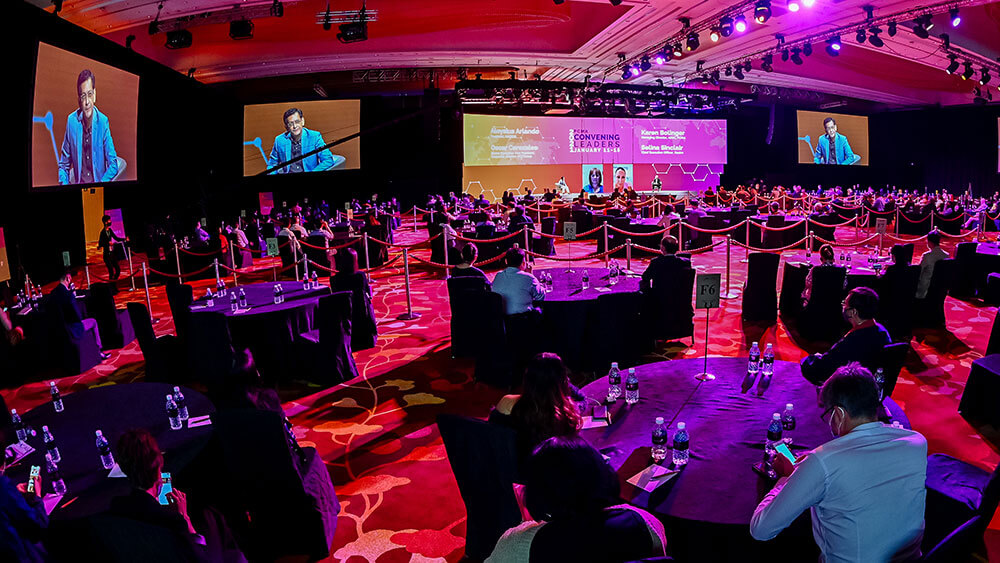
Hybrid events are two distinct events — a digital event and an in-person event — and they should be programmed that way, says Don Neal, founder and CEO of 360 Live Media. (Syafiq AB photo)

“Your next event must be programmed like TV, produced like Broadway, and sold like Hollywood.” — Don Neal
There is no such thing as a hybrid retailer. A retailer sells merchandise via a store or a screen. Music is not hybrid, it’s either recorded or live. Same with entertainment — it’s either Broadway or Hollywood, live or on a screen. Sure, there are exceptions, but stay with me on this.
Digital events are like TV. Television is a medium about sensation, not information. It’s about moving pictures, visual stimulation, entertainment, and keeping your attention. That’s why today’s news broadcasts no longer follow the Walter Cronkite model of sharing information, facts, and images. It’s more “situation room,” drama, controversy, and video footage of a disaster — they must keep your attention with images and graphics, not simply convey the facts.
Did you know in the early days of TV, they simply pointed a camera at a radio announcer? Just like the early days of television, we are in the early stages of digital events. (I don’t call them “virtual events,” just as I don’t call a movie “virtual entertainment.” What we call it matters.)
If we’ve learned anything from the last 18 months, it’s that digital events are difficult to design, deliver, and scale. They don’t fully engage the audience and they are generally not profitable. Digital events can be very successful but must be reimagined as they become an adjunct to your live, in-person event. A new strategy, design approach, and business model must be adopted.
If you’re having a “hybrid” event, you’re having two distinct events. One is on a screen and must do a different job for a different audience than the in-person event, which will attract a separate audience expecting — and willing to pay for — another kind of experience.
One side note: We all know sponsors and exhibitors want to be in person, period. They will fund and support a digital format if you give them the right reasons to participate. How you blend the two domains makes a big difference to your bottom line.
Here are a few approaches to consider for your digital event:
- Program it like a TV show — make it watchable.
- Don’t program content to run more than four hours per day. Enable the audience to watch it on-demand.
- Commercialize it like social media. Monetize the audience by allowing sponsors to get access to the viewer data. Sell commercials. Identify underwriters to subsidize portions of your broadcast that align with their interests.
The in-person event — remember, it’s not hybrid — must be different and better than 2019, if you want to expand your audience, command a premium registration fee, and get your exhibitors back and willing to pay premium rates for a potentially smaller audience.
- Don’t start planning 2022 in-person events as you did in the past. Resist the pull of “better sameness” design. General sessions, breakouts, and traditional expo halls can still work — but not in the same way they used to. For example, try introducing a controversial topic that will unite, polarize, and activate the largest possible audience — we call this the macro topic. The new aerospace event, ASCEND, did this last year with an online event held Nov. 16-18. The conference’s macro topic was Staking Your Claim to the Trillion-Dollar Space Economy. Then the macro topic was broken down into smaller meta-topics such as space mining; then drilled down lower to micro-topics, including asteroid mining for platinum.
- Repurpose the best elements of your in-person event and convert and translate them into programming for your digital event. Establish criteria that your team can use to decide what goes where — online or in person — based on the pointers I’ve provided here.
- Sell your 2022 event differently — yes, I said sell, not market. It’s time to change how trade shows, conferences, and annual meetings are sold. You are competing with Madison Avenue and Hollywood for-profit event producers, and the click-bait mania on social media. Take the gloves off and rethink how you entice, attract, persuade, and lure an audience to see your event as the indispensable, irresistible experience that it is.
If there ever was a time when nonprofit event leaders had the opportunity to redefine what an event can be to deliver on the mission, deliver the money, and engage their members, this is it.
Don Neal is founder and CEO of marketing, strategy, and experience agency 360 Live Media.
